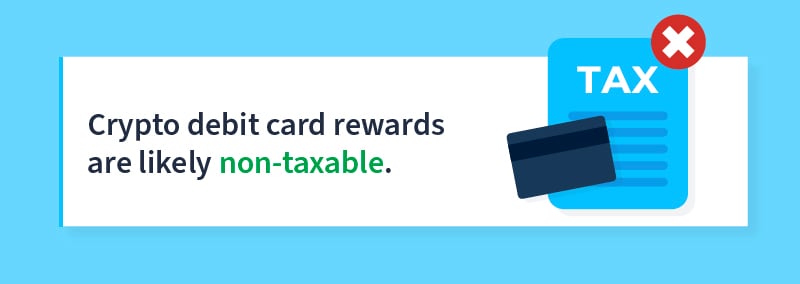

In this guide, we’ll break down the tax implications of crypto debit cards and credit cards and share some steps to help make sure that you’re accurately reporting your taxes!
Are transactions with crypto debit cards and credit cards taxable?
Yes. Like the taxes associated with other crypto transactions, crypto debit card transactions may be subject to capital gains and income tax.
How are crypto debit cards taxed?
.jpg)
Typically, cryptocurrency debit cards convert cryptocurrency to fiat at the point of sale. This is considered a disposal of cryptocurrency that is subject to capital gains tax.
Let’s look at an example to understand how an individual purchase might be taxed.
Phillip buys $200 of Ethereum.
The price of Phillip's Ethereum rises to $500.
Phillip buys a Playstation 5 with his crypto debit card for $500.
$500 of Phillip's Ethereum is converted to fiat.
Phillip incurs $300 of capital gain. (500-200)
To accurately report your taxes, you’ll need to keep records of each one of these disposal events.
Some debit cards allow customers to transfer their cryptocurrency to fiat on a lump sum basis rather than on a transaction-by-transaction basis. In this case, the conversion from crypto to fiat is still treated as a taxable event. However, there’s no need to report each individual purchase on your tax return.
What about purchases made with stablecoins?
Many crypto debit cards support stablecoin purchases. It’s important to remember that stablecoins are treated the same as any other cryptocurrency for tax purposes and will still be subject to capital gains tax.
However, it’s likely that any capital gain that you incur will be close to zero.
Are there any tax advantages to using a crypto debit card?

Believe it or not, using your cryptocurrency card can actually reduce your tax bill for the year — provided that the price of your tokens has fallen since you originally received it.
If the fair market value of your cryptocurrency is lower than it was at the time you purchased it, you can claim a capital loss on your taxes. This can offset your capital gains for the year and up to $3,000 of ordinary income.
For more information, check out our guide to tax loss harvesting.
Are debit card rewards taxable?
While the IRS has not provided specific guidance on crypto debit cards, it’s reasonable to assume that cashback rewards for spending will not be considered taxable — similar to traditional debit cards.
However, rewards that are given simply for opening a new account will likely be considered income.
How are crypto credit cards taxed?
Crypto credit cards are taxed differently than debit cards. When you make a purchase, you are simply making a purchase on credit rather than converting your existing cryptocurrency to fiat.
This means that crypto credit transactions are not subject to capital gains tax.
Are credit card rewards taxable?

Based on how the IRS has treated credit card rewards in the past, it’s reasonable to assume that rewards that are given simply for opening a new account with no spending requirements will be considered income.
However, rewards with spending requirements will most likely be considered non-taxable rebates.
Do I pay taxes when I dispose of my debit/credit card rewards?
Disposing of either your debit or credit card rewards will be considered a taxable event. If you sell the rewards you receive, trade them for other cryptocurrencies, or use them to buy goods or services, you may incur capital gains depending on how the price of your rewards has fluctuated since you originally received them.
Stay on top of your debit card transactions
Looking for an easy way to report taxes on your debit card and other crypto transactions?
Cryptocurrency tax software like CoinLedger can help. The platform integrates with card providers like Coinbase and Crypto.com to automatically import your transactions. Once you have your data synchronized, you’ll be able to generate a complete crypto tax report in minutes.
Get started with a free preview report today. There’s no need to enter your credit card information until you’re 100% sure the information you have is accurate.
Frequently asked questions
- Do you pay taxes on crypto payments?
Paying for goods and services with cryptocurrency is considered a taxable disposal of crypto subject to capital gains tax.
- Are crypto debit cards traceable?
Most crypto debit card providers require you to provide Know Your Customer information to get started. As a result, it’s likely that your crypto debit card transactions can be traced back to you.
- Do crypto debit cards report to the IRS?
Because most crypto debit card providers collect Know Your Customer information, it’s likely that they will report to the IRS upon request.
- Do you pay taxes on a Coinbase debit card?
When you make purchases with a Coinbase debit card, your cryptocurrency is converted to fiat currency. This is considered a taxable disposal of crypto subject to capital gains tax.
How we reviewed this article
All CoinLedger articles go through a rigorous review process before publication. Learn more about the CoinLedger Editorial Process.

CoinLedger has strict sourcing guidelines for our content. Our content is based on direct interviews with tax experts, guidance from tax agencies, and articles from reputable news outlets.




































.png)
















